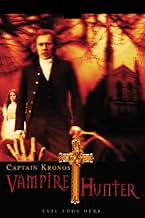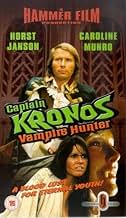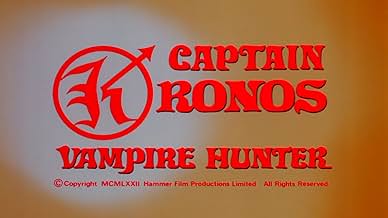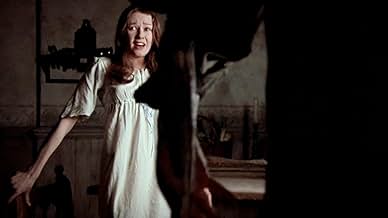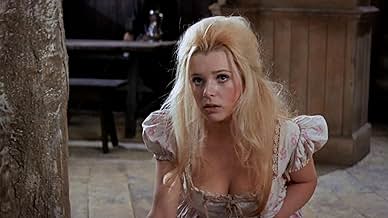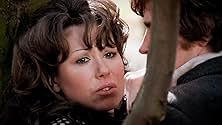NOTE IMDb
6,4/10
6,1 k
MA NOTE
Ajouter une intrigue dans votre langueA master swordsman and former soldier and his hunchbacked assistant hunt vampires.A master swordsman and former soldier and his hunchbacked assistant hunt vampires.A master swordsman and former soldier and his hunchbacked assistant hunt vampires.
Avis à la une
Proof definite that Hammer could survive without Christopher Lee, Peter Cushing, or even their borrowed Universal monsters (Frankenstein's monster, Dracula, the Mummy). Kronos is an entirely original take on vampires and monster-hunting. Brian Clements (The Avengers) has fun with the concept, and you're never quite sure if you're watching a parody or a homage. Kronos works either way, though. Check out the swordfight scene that's a parody of every Western ever, when Kronos kills three men before they (or us) can see him draw his sword. Lots of action, and an interesting vampire concept, make for a must-see movie.
Among the least known of the Hammer Studios horror output, Captain Kronos: Vampire Hunter is also one of its most interesting and unusual productions. As opposed to the more in-your-face Dracula series that immortalized Christopher Lee, CK:VH knows that it is just a cinematic comic book and works with itself in a restrained, somewhat lighthearted way that is, off and on, quite effective. This film never really tries to outright scare you which, I think, is extremely cool. Instead, it sets an atmospheric table at which your imagination is invited to partake. This suave slant is the work of Director Brian Clemens who was largely responsible for the legendary '60's British TV series, The Avengers; the original, with Patrick Macnee and Diana Rigg. If you remember that series, you'll recognize some of its essential look and feel in this film. Viewed from one azimuth, CK:VH is nonsense but, if you lighten up a bit and just get into the story, the movie takes on a dreamy quality against which its more `horrific' elements play in a most interesting way.
The setting, never precisely defined, seems to be central Europe during or just after the Napoleonic Wars (from the clothes). Let's call it early 19th century. Captain Kronos himself appears to be a former officer of Dragoons, separated from service although still in uniform. The implication is that, while away in the wars, he lost his wife, and possibly his child, to vampires. Now, in the company of his good friend, a hunchbacked academic and authority on vampire lore who drives a wagon loaded with tools of the vampire-killing trade, the Captain roams the region hunting the undead.
Captain Kronos is played by the German actor Horst Janson who, with his grave, nearly too-nordic features, balanced by eyes that seem to constantly smile, brings a nice sense of mystery to the role. Kronos is aloof and taciturn, though never unpleasant. He smokes long cheroots and carries a Samurai sword that he, evidently, did not acquire at a flea market. We don't learn the history of the sword, but we see that he can definitely wield it, as does a trio of toughs fronted by the local alpha-blade (the late Ian Hendry, a prominent British character actor of the period who, interestingly, was a regular during the Avengers' first season.) Actually, they don't really see the sword. They just feel it, sort of, before collapsing in a heap. Janson plays the Captain with a certain Playboy Magazine, lady's man sense of cool, echoing a time when people were just finishing up talking about sex and beginning to actually do it. If you were around then, you'll recognize the spin. It's a nostalgia hit, for sure. You might even recognize Janson's face, which was seen in full page ads in American magazines during that period; men's apparel, liquor, etc.
The Captain and his trusty companion have arrived in the film's locale in response to rumors of bad happenings. Young women of the area are undergoing drastic reverse-makeovers, emerging from them as exsanguinated centenarians. The locals, rather superstitious rural types, are in a tizzy. Could the recently-deceased head of the local, reclusive aristocratic family, whom some suspect of not being completely dead, be involved? It's an angle definitely worth investigating. The Captain makes contact with the only person in the area still in possession of his wits - the local physician - and the hunt begins.
If most Hammer films tend to be hissing fastballs down the middle, CK:VH is an off-speed slider on the corner. There's nothing fancy here, no baroque sets or sophisticated effects. In fact, the film overall has a sparse look and feel that enhances its credibility. The hunt for the vampire proceeds as a believable combination of scientific method and lore. Much of what transpires does so in daylight which, to me, carries significant implications. Evil that does not fear sunlight carries a big stick. We, as its prey, have no real hiding place. The film balances its occasionally goofy moments by never sacrificing its dignity and, at times, is quite poignant. It also features one of the most brilliantly effective sequences ever seen in this genre, illustrating how much can be accomplished with the simplest of cinematic means. I think you'll know it when you see it. This film was produced as the first in what was hoped to be a series of Captain Kronos adventures but the concept failed to grab the required audience. Pity, but at least we have this one. It's fun, stylish, and a perfect rainy-day diversion.
The setting, never precisely defined, seems to be central Europe during or just after the Napoleonic Wars (from the clothes). Let's call it early 19th century. Captain Kronos himself appears to be a former officer of Dragoons, separated from service although still in uniform. The implication is that, while away in the wars, he lost his wife, and possibly his child, to vampires. Now, in the company of his good friend, a hunchbacked academic and authority on vampire lore who drives a wagon loaded with tools of the vampire-killing trade, the Captain roams the region hunting the undead.
Captain Kronos is played by the German actor Horst Janson who, with his grave, nearly too-nordic features, balanced by eyes that seem to constantly smile, brings a nice sense of mystery to the role. Kronos is aloof and taciturn, though never unpleasant. He smokes long cheroots and carries a Samurai sword that he, evidently, did not acquire at a flea market. We don't learn the history of the sword, but we see that he can definitely wield it, as does a trio of toughs fronted by the local alpha-blade (the late Ian Hendry, a prominent British character actor of the period who, interestingly, was a regular during the Avengers' first season.) Actually, they don't really see the sword. They just feel it, sort of, before collapsing in a heap. Janson plays the Captain with a certain Playboy Magazine, lady's man sense of cool, echoing a time when people were just finishing up talking about sex and beginning to actually do it. If you were around then, you'll recognize the spin. It's a nostalgia hit, for sure. You might even recognize Janson's face, which was seen in full page ads in American magazines during that period; men's apparel, liquor, etc.
The Captain and his trusty companion have arrived in the film's locale in response to rumors of bad happenings. Young women of the area are undergoing drastic reverse-makeovers, emerging from them as exsanguinated centenarians. The locals, rather superstitious rural types, are in a tizzy. Could the recently-deceased head of the local, reclusive aristocratic family, whom some suspect of not being completely dead, be involved? It's an angle definitely worth investigating. The Captain makes contact with the only person in the area still in possession of his wits - the local physician - and the hunt begins.
If most Hammer films tend to be hissing fastballs down the middle, CK:VH is an off-speed slider on the corner. There's nothing fancy here, no baroque sets or sophisticated effects. In fact, the film overall has a sparse look and feel that enhances its credibility. The hunt for the vampire proceeds as a believable combination of scientific method and lore. Much of what transpires does so in daylight which, to me, carries significant implications. Evil that does not fear sunlight carries a big stick. We, as its prey, have no real hiding place. The film balances its occasionally goofy moments by never sacrificing its dignity and, at times, is quite poignant. It also features one of the most brilliantly effective sequences ever seen in this genre, illustrating how much can be accomplished with the simplest of cinematic means. I think you'll know it when you see it. This film was produced as the first in what was hoped to be a series of Captain Kronos adventures but the concept failed to grab the required audience. Pity, but at least we have this one. It's fun, stylish, and a perfect rainy-day diversion.
While few of the Hammer horror films took themselves too seriously it was in the 1970s when the cycle became almost a parody of itself and "Captain Kronos, Vampire Hunter" is perhaps the best example of this. Although it is a little known film it is certainly one of the best horrors, largely due to its original take on the vampire theme and imaginative, albeit risky, casting.
Rather than offer the audience another Christopher Lee dominated vampire flick, "Kronos" features Horst Janson in the title role and he is essentially the Clint Eastwood character from the Sergio Leone Spaghetti Westerns. This means Kronos is unstoppable with a sword and can kill several men with one quick swish of his blade, best displayed when the brilliant Ian Hendry and his mob make the mistake of picking a fight with him.
It is important not to take the film or the cast too seriously as this is essentially a comedy-horror. There are several very amusing scenes such as when Kronos and his hunchbacked helper struggle to find a way to destroy a particularly nasty vampire, making light of the many and varied ways to supposedly kill one of the undead.
Like all Hammer Horror films "Kronos" benefits from having a short 90- minute running time, concentrating more on action and bloodletting than the idle chat that typified Francis Ford Coppola's "Bram Stoker's Dracula". It is also good to see a vampire film in which the hero is dangerous and unpredictable and not entirely wholesome such as the Van Helsing character often is.
Anyone who found "Blade" to be too noisy and over-the-top (karate and vampires do not go together) should watch "Kronos" which is essentially the same film but far more subtle - like the difference between using a scalpel and a chainsaw.
Rather than offer the audience another Christopher Lee dominated vampire flick, "Kronos" features Horst Janson in the title role and he is essentially the Clint Eastwood character from the Sergio Leone Spaghetti Westerns. This means Kronos is unstoppable with a sword and can kill several men with one quick swish of his blade, best displayed when the brilliant Ian Hendry and his mob make the mistake of picking a fight with him.
It is important not to take the film or the cast too seriously as this is essentially a comedy-horror. There are several very amusing scenes such as when Kronos and his hunchbacked helper struggle to find a way to destroy a particularly nasty vampire, making light of the many and varied ways to supposedly kill one of the undead.
Like all Hammer Horror films "Kronos" benefits from having a short 90- minute running time, concentrating more on action and bloodletting than the idle chat that typified Francis Ford Coppola's "Bram Stoker's Dracula". It is also good to see a vampire film in which the hero is dangerous and unpredictable and not entirely wholesome such as the Van Helsing character often is.
Anyone who found "Blade" to be too noisy and over-the-top (karate and vampires do not go together) should watch "Kronos" which is essentially the same film but far more subtle - like the difference between using a scalpel and a chainsaw.
Now I'm a big horror fan, but ironically enough I finally decided to give this one a go because of the western and swordfighting angle it has (I'm a big fan of both spaghetti westerns and chambaras). And therein lies the power of Captain Kronos: it's more than your typical Hammer vampire entry. It manages to be both serious and tongue-in-cheek, both atmospheric and visceral, and thus operates on a whole other level than earlier Hammer vampire flicks which I find very formulaic.
Captain Kronos is a swashbuckling vampire hunter, a mixture of the spaghetti western cool anti-hero and the antagonist of evil that is usually the Van Helsing character. In true Clint Eastwood fashion, he smokes a stump, swaps the poncho for an 18th century army jacket and the six shooter for various swords (including a katana). His sidekick is the witty vampire expert Professor Grost and along with Carla, a gypsy girl they pick along the way (played by Caroline Munro), they're called upon to solve a case of vampirism in rural England.
What strikes me about Captain Kronos is the exceptional cinematography. Director Brian Clemens employs some very inventive angles to photograph the action, leaving more to the mind's eye through use of shadows and eliptical editing. Highlights include the shadow of a cross coming to life and the shadow of a man being hanged seen through a window. The exterior shots are all well composed, with the thick black soil, the trees and the bleak weather all coming together as the perfect setting for the vampires to wreak havoc. There are also some very chillng moments (like the hooded vampires in the forest and a very creepy old lady), so don't be mistaken: Captain Kronos might take its cue from action movies, but it's still essentially a horror flick at heart.
Of course it's not without its flaws. Horst Janson (Captain Kronos) is by no means a physical actor so the action scenes leave a lot to be desired. His swordfighting as seen in the cemetery scene is lamentably bad. It's no wonder that the best scene of him using a sword is in the tavern where he teaches three bullies a lesson. His slashing there is composed in the editing room. OK this is Hammer, not Toho or Daei, and Janson couldn't possibly dream of equalling a Mifune or Nakadai, but still a couple of swordfighting lessons wouldn't have been such a bad idea. What's worse is that Janson is not a good actor period. His range involves little more than trying to look cool. Even at that, his boyish face and blonde hair don't help at all. He's more stiff and wooden than "badass" cool. A more charismatic lead would have done wonders for Captain Kronos.
Anyways, this is a movie that deserves to be rediscovered by all sorts of 70's b-movie fans. I'm not a vampire fan by any means, so it's very refreshing to see a movie playing with the conventions and clichés of the sub-genre (which I find tiresome for the most part) in entertaining ways.
Captain Kronos is a swashbuckling vampire hunter, a mixture of the spaghetti western cool anti-hero and the antagonist of evil that is usually the Van Helsing character. In true Clint Eastwood fashion, he smokes a stump, swaps the poncho for an 18th century army jacket and the six shooter for various swords (including a katana). His sidekick is the witty vampire expert Professor Grost and along with Carla, a gypsy girl they pick along the way (played by Caroline Munro), they're called upon to solve a case of vampirism in rural England.
What strikes me about Captain Kronos is the exceptional cinematography. Director Brian Clemens employs some very inventive angles to photograph the action, leaving more to the mind's eye through use of shadows and eliptical editing. Highlights include the shadow of a cross coming to life and the shadow of a man being hanged seen through a window. The exterior shots are all well composed, with the thick black soil, the trees and the bleak weather all coming together as the perfect setting for the vampires to wreak havoc. There are also some very chillng moments (like the hooded vampires in the forest and a very creepy old lady), so don't be mistaken: Captain Kronos might take its cue from action movies, but it's still essentially a horror flick at heart.
Of course it's not without its flaws. Horst Janson (Captain Kronos) is by no means a physical actor so the action scenes leave a lot to be desired. His swordfighting as seen in the cemetery scene is lamentably bad. It's no wonder that the best scene of him using a sword is in the tavern where he teaches three bullies a lesson. His slashing there is composed in the editing room. OK this is Hammer, not Toho or Daei, and Janson couldn't possibly dream of equalling a Mifune or Nakadai, but still a couple of swordfighting lessons wouldn't have been such a bad idea. What's worse is that Janson is not a good actor period. His range involves little more than trying to look cool. Even at that, his boyish face and blonde hair don't help at all. He's more stiff and wooden than "badass" cool. A more charismatic lead would have done wonders for Captain Kronos.
Anyways, this is a movie that deserves to be rediscovered by all sorts of 70's b-movie fans. I'm not a vampire fan by any means, so it's very refreshing to see a movie playing with the conventions and clichés of the sub-genre (which I find tiresome for the most part) in entertaining ways.
Was Horst Janson really forty years old when he made this? Damn, the man looked good!
Horst plays Captain Kronos, a man who wears a snappy uniform and hunts youth-draining vampires in the company of an affable hunchback. He also wears a bag on his head as part of some bizarre meditative ritual. Aside from the bag-wearing part, he's a solid action hero, and it's a shame that Hammer never turned this good little movie into one of its long-running franchises.
The acting is a highlight: John "don't call me Johnny" Carson gives one of his typically likable and neurotic performances as Doctor Marcus, Wanda Ventham makes a lovely villainess, and Ian Hendry has an amusing cameo as an obnoxious thug (how the mighty had fallen, though -wasn't he a star at one point?). There's also great lines aplenty and some nice choreography for the sword-fights.
This is the kind of movie that Full Moon - or for that matter, Dimension films - wishes it could make. Alas, modern horror is usually too gross and uninventive to match the charm and creativity of a Hammer "classic" such as "Captain Kronos."
Horst plays Captain Kronos, a man who wears a snappy uniform and hunts youth-draining vampires in the company of an affable hunchback. He also wears a bag on his head as part of some bizarre meditative ritual. Aside from the bag-wearing part, he's a solid action hero, and it's a shame that Hammer never turned this good little movie into one of its long-running franchises.
The acting is a highlight: John "don't call me Johnny" Carson gives one of his typically likable and neurotic performances as Doctor Marcus, Wanda Ventham makes a lovely villainess, and Ian Hendry has an amusing cameo as an obnoxious thug (how the mighty had fallen, though -wasn't he a star at one point?). There's also great lines aplenty and some nice choreography for the sword-fights.
This is the kind of movie that Full Moon - or for that matter, Dimension films - wishes it could make. Alas, modern horror is usually too gross and uninventive to match the charm and creativity of a Hammer "classic" such as "Captain Kronos."
Le saviez-vous
- AnecdotesThis was to have been the first in a series of films. The poor box office cancelled those plans. The poor returns also contributed to the decline in the box office track record of Hammer Films.
- GaffesAt time 1:04:40, as the young girl puts the lamp down on the table, you can briefly see the electrical cord fall to the ground from under her arm, where it was hidden while she walked down the steps.
- ConnexionsFeatured in Rear Window: Dracula: The Undiscovered Country (1993)
Meilleurs choix
Connectez-vous pour évaluer et suivre la liste de favoris afin de recevoir des recommandations personnalisées
- How long is Captain Kronos: Vampire Hunter?Alimenté par Alexa
Détails
Box-office
- Budget
- 160 000 £GB (estimé)
- Montant brut mondial
- 442 $US
- Durée1 heure 31 minutes
- Couleur
- Rapport de forme
- 1.85 : 1
Contribuer à cette page
Suggérer une modification ou ajouter du contenu manquant


